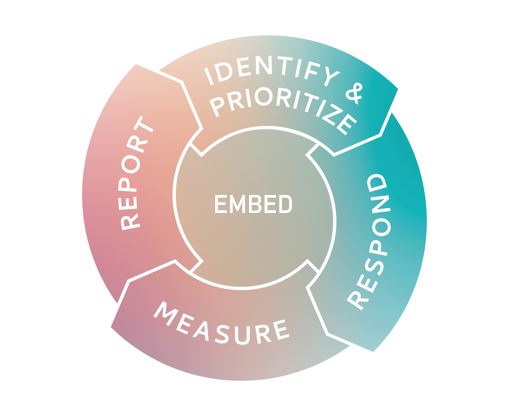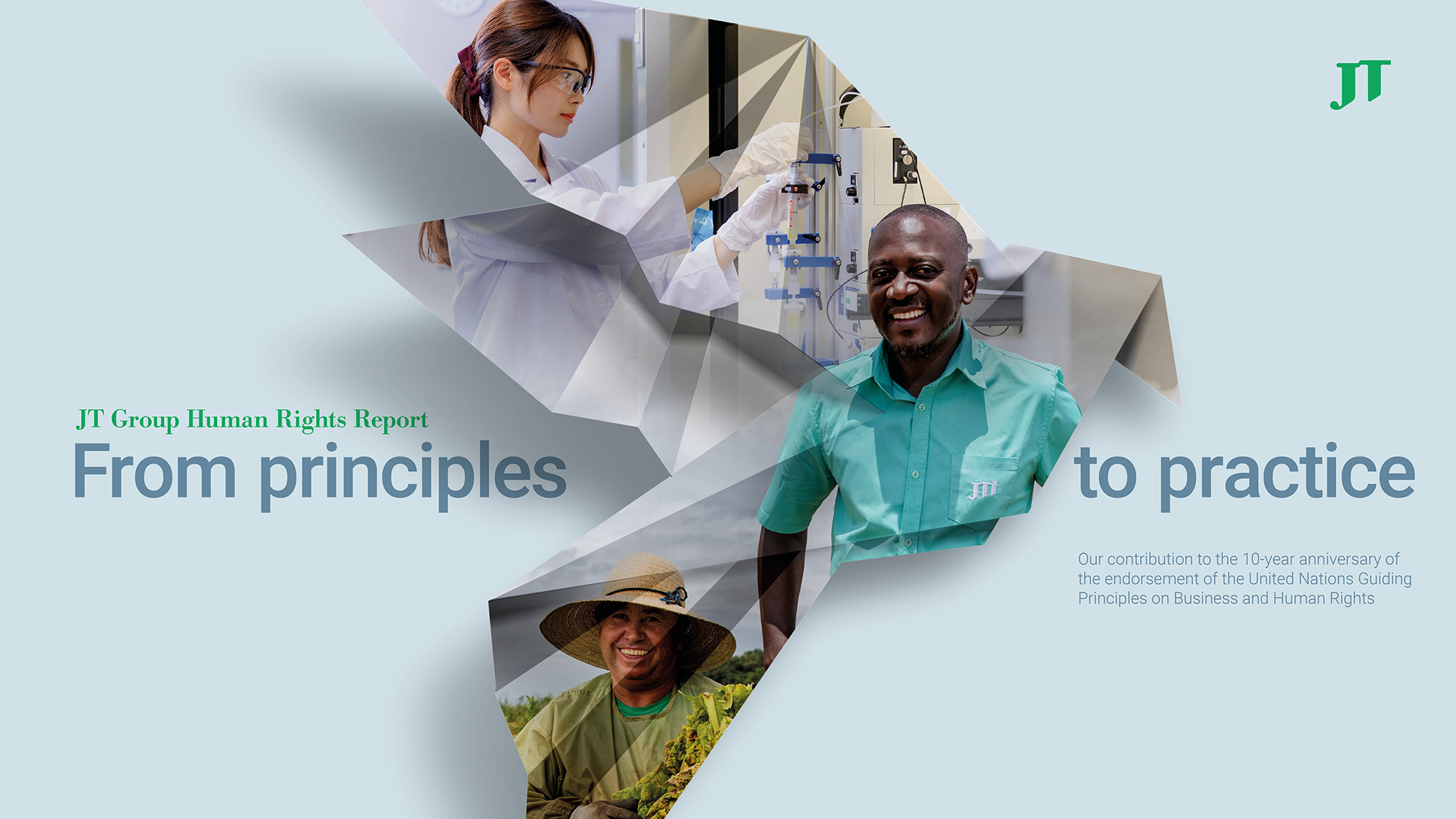We operate in parts of the world where human rights are at risk, and we are therefore exposed to human rights-related issues, such as forced labor, child labor, bribery, and corruption.
Our commitment
JT Group Human Rights Policy
We respect human rights across our value chain and recognize the Universal Declaration of Human Rights, the International Bill of Human Rights, and the International Labour Organization’s Declaration on Fundamental Principles and Rights at Work. Our JT Group Human Rights Policy, which has been approved by the JT Board of Directors, follows the framework provided by the UN Guiding Principles on Business and Human Rights. This means working to avoid infringing the rights of others, and addressing any adverse impacts of our global operations.
Our commitment to human rights is reinforced by our Board of Directors through our Code of Conduct. Our Reporting Concerns Mechanism helps us ensure that we listen to and act on the grievances of those whose human rights might be impacted by our activities. Through this legitimate, fair, and accessible mechanism, we encourage employees and suppliers to speak up on human rights, without fear of retribution, about any concerns they may have.
Our suppliers and growers throughout the world are obliged to respect human rights by adopting and maintaining internationally recognized labor standards regarding child labor, rights of workers, and workplace health and safety. They do this in line with:
To address our human rights issues, markets put in place their own customized corrective measures through human rights action plans. We also have global programs that can be applied by the local markets to ensure a consistent approach across the Group.
Read more:
Our human rights strategy
Our approach
Our human rights strategy is based on five pillars. This circular approach provides a systematic way of conducting ongoing due diligence and is in line with the UN Guiding Principles on Business and Human Rights, the Organisation for Economic Co-operation and Development (OECD) guidelines, and the Food and Agriculture Organization (FAO) guidance on responsible agricultural supply chains.
- Embed
- Identify and Prioritize
- Respond
- Measure
- Report
Read more on “Strategy” in our Human Rights Report.
Our progress
Embed
To create a global culture around equality, respect and human rights, since 2016 we have continually provided training programs for the entire Group. The content of our very first e-learning on respecting human rights was totally aligned to the UN Guiding Principles, and was implemented from 2016 to 2019. The e-learning has been provided in 25 languages.
In 2022, the tobacco business launched a new company-wide human rights e-learning module. The platform was made accessible to all tobacco business employees via desktop and mobile and in 37 languages. It offers a new way of learning about human rights through dynamic and interactive bite-size content. The training program helps enable employees to spot human rights impacts and prevent abuses occurring in our workforce and supply chain, working to instill a better understanding of how these issues play out in practice, using practical everyday examples.
Read more on “Culture change through training” in our Human Rights Report.
Identify and prioritize
Human rights due diligence is an integral part of our business - it aligns us with the UN Guiding Principles on Business and Human Rights, and enables us to identify actual and potential human rights risks across our own operations and those of our suppliers and partners.
Human Rights Impact Assessments
Our Human Rights Impact Assessments focus on impacts to people within our main operations and value streams. Key activities during an impact assessment include visiting and observing farming, processing, manufacturing, and sales and distribution operations. During the assessments, we conduct a series of interviews with employees and workers, as well as representatives of suppliers, clients, and partners. At the end of the assessment, we report on the findings and discuss recommendations for improvement with local management. Our head office then works closely with the local team to address any issues raised and improve the situation.
In total, we have completed 10 Human Rights Impact Assessments across our entire value chain: Bangladesh, Dominican Republic, Egypt, Ethiopia, Kazakhstan, Kyrgyzstan, Malaysia, Mexico, Myanmar, and Tanzania.
Self-assessment questionnaires
On the recommendation of our External Human Rights Advisory Board, in 2019, we introduced a self-assessment questionnaire to evaluate the human rights profile of more countries, and to increase the scope and impact of our human rights due diligence. Following the same methodology as our Human Rights Impact Assessments, this smartly designed survey targets our lower-ranked high-risk countries that have not been prioritized for Human Rights Impact Assessments in the short term. During the pandemic, the self-assessment questionnaire become a valuable tool for conducting remote human rights due diligence.
In total, we have completed 19 self-assessment questionnaires across our entire value chain.
Assessments for tobacco leaf supply chain
In 2022 we also conducted three supply chain impact assessments in Brazil, Indonesia, and Tanzania. These assessments provide a more comprehensive understanding of the human rights impacts within one specific part of our value chain - our tobacco supply chain and tobacco growing business - and the challenges that tobacco growers face in their communities. In 2022, we have also initiated similar assessments with the same goal under the umbrella of industry Sustainable Tobacco Program - in-depth assessments.
Our existing programs - Agricultural Labor Practices (ALP), Achieving Reduction of Child Labor in Support of Education (ARISE) and Grower Support Programs (GSP) - fit perfectly within our five-pillar strategy: ALP supports the identification part of the cycle, while ARISE and GSP support our response. The ARISE and GSP programs are specifically designed to improve the livelihoods of those within the communities where we operate by overcoming issues such as access to education or access to safe drinking water. Our investments include building boreholes and water distribution points, investing in solar projects, and refurbishing structures that provide basic social services.
Read more:
Respond
We develop human rights action plans for each country that has undertaken an assessment, each with an agreed timeline. Human rights champions have been appointed within these countries, as part of a network. The responsibility of this network is to ensure that action plans are managed and implemented by each country, and respect for human rights is firmly established in the business.
The human rights champions manage the implementation of the action plans locally. Our tobacco business head office provides the champions with training materials on the UN Guiding Principles on Business and Human Rights, as well as support with specific points within the action plans.
Read more:
Measure
We have been measuring the effectiveness of our action plans, which include an individual set of key performance indicators to measure the effectiveness of our improvements over time. Our human rights champions track the implementation of each action item and report on a quarterly basis to the human rights team to measure progress.
There are various ways to measure the effectiveness of our responses in our leaf supply chain. One of them is the number of issues which we observe during subsequent crop cycles.
Read more on Sustainable farming practices and farmer livelihoods
Report
Our understanding of our obligations under the UN Guiding Principles is to “know and show” that we are aware of the potential human rights-related risks to which we may be connected, and that we are taking appropriate steps to manage those that occur. The UN Guiding Principles encourage corporate transparency to the benefit of a broad set of stakeholders. We are committed to this level of transparency and disclosure.
In 2021, to coincide with the 10th anniversary of the United Nations Guiding Principles on Business and Human Rights, we published our first standalone Human Rights Report, which examines the potential human rights risks arising from our worldwide operations. The report identifies nine salient human rights issues and the steps we are taking to remedy them.
JT Group Human Rights Report
Governance
Our CEO and the Board of Directors play a key role in formulating the JT Group sustainability strategy, which has respect for human rights at its core. They oversee and are accountable for the effectiveness of this strategy, as they are committed to the Group achieving its sustainability targets. The Chief Sustainability Officer is responsible for driving sustainability across the Group, including respect for human rights.
While our CEO and Board of Directors are accountable for the strategy, governance, and reporting of adherence to the JT Group Human Rights Policy, each local business unit is responsible for operational implementation and has an appropriate management system to apply human rights initiatives. This is driven by our dedicated Human Rights team, which is also responsible for raising awareness and improving engagement internally.
To secure an effective due diligence system, it is critical to link impact assessments to effective governance structures that ensure accountability for acting on the findings. The human rights champions network plays a vital role to facilitate the sharing of guidance and best practice on human rights by those closest to the issues on the ground.
To advance the rights of our stakeholders, it is important that we listen to the advice, concerns, and criticisms of people outside the JT Group. Therefore, we have continued to take counsel from our Human Rights External Advisory Board.
Human Rights External Advisory Board
In our tobacco business, the Human Rights External Advisory Board plays a vital role in providing us with a broad external perspective in the human rights area. Made up of international experts on business and human rights, the Board advises us on all issues that the members consider relevant for the implementation of our human rights strategy. The panel of experts guide us with their expertise and challenge us where they believe we need to improve, helping to strengthen our efforts to deliver on our human rights commitments.
Board members include:
- Paul Bowden (Professor of Law, The Nottingham Law School)
- Donna L. Westerman (Sustainable Purchasing Leadership Council)
- Rona Starr (Association for Professional Social Compliance Auditors)
- Jonathan Drimmer (Paul Hastings (a leading international law firm))
- Richard Karmel (Mazars (a leading international audit, tax and advisory firm))
Supply Chain Due Diligence Committees
These committees work across the Leaf operations to ensure meaningful processes are developed and implemented to act on the assessment findings. Led by senior management, the committees are crucial to ensuring that we meet our long-term improvement objectives.
External experts
These experts work together with support from organizations such as Business for Social Responsibility (BSR), providing us with technical support as we strive for continual improvement in our human rights strategy and our approach to due diligence.
Read more on “Board oversight and governance” in our Human Rights Report.
Salient human rights issues
To strengthen the focus of our policies and programs on human rights areas that matter most, it is crucial to have an understanding of our respective salient human rights issues.
According to the UN Guiding Principles Reporting Framework, “a company’s salient human rights issues are those human rights that stand out because they are at risk of the most severe negative impact through the company’s activities or business relationships.”
The concept of salience focuses on the risk to people, not to the business, and impacts are prioritized according to their severity and likelihood.
We created our first Group human rights risk maps to assist us in developing JT Group Human Rights Policy in 2016. As external and internal environments have evolved, we have reviewed our group salient issues in 2021. These reviews resulted in the identification of nine salient issues associated with our own operations, value chain and new business relationships.
Our nine salient issues
Identification of salient issues
In order to identify the salient human rights issues for the JT Group, the assessment was conducted in two aspects, Severity and Likelihood, in line with the UN Guiding Principles on Business and Human Rights. Firstly, we identified the full range of human rights that could potentially be negatively impacted by our activities or through its business relationships. We then prioritized potential negative impacts by using severity and likelihood framework.
Severity assessment
The severity of human rights impacts was assessed by the scale, scope, and irremediability of the impacts, which means how grave the impact would be, how widespread the impact would be, and how hard it would be to put right the resulting harm. Based on that framework, we identified the severity of each human rights issue using a scoring system for risk mapping.
Likelihood assessment
In assessing the likelihood of human rights issues in our value chain, the following steps were taken. We analyzed the operations of our entire value chain (in over 130 countries) across five categories; Leaf sourcing, Processing, Manufacturing, Office, and Sales and Marketing. We determined magnitudes of risk for each operational category in each country. We then quantified each risk using environmental and social country indices published by a leading global risk analytics company, and using country indices published by international organizations.
Risk mapping
These mapping exercises were carried out for all three of our businesses; tobacco, pharmaceuticals, and processed food. In the consolidated map of those businesses, the issues of high severity and high likelihood were finally identified as salient in the JT Group.
- Child labor
- Environmental impacts
- Fair wage
- Forced labor
- Harassment and gender impacts
- Health and safety
- Health risk
- Non-discrimination and equality
- Working hours
Knowing what our salient issues are has been vital to prioritizing our work. However, this list is not exhaustive. We know that there are other important and novel human rights issues in our value chain. We know we need to keep our salient issues under review in order that we remain focused on the things that matter most.
Read more on “Salient issues” in our Human Rights Report.
Read more on “Salient issues” on JT International sustainability website.
Our human rights due diligence
In line with the UN Guiding Principles, we have made human rights due diligence an essential and integrated part of our business. This enables us to identify and assess actual and potential human rights risks, as stated in our JT Group Human Rights Policy.
Embedding human rights due diligence - which is in part informed by our widely applied Human Rights Impact Assessments - is our responsibility. It helps us to prevent adverse impacts on people and ensure the highest standards of behavior are upheld within our business and value chain.
We have committed to assessing 100% of high-risk countries by 2025.
In addition to the high-risk countries identified, we completed the assessment in Japan where our headquarters and many subsidiary companies are located, given its scale of businesses; tobacco, pharmaceuticals, and processed food. We also conducted the assessment in Switzerland, headquarters of our tobacco business, and also in China and Thailand for our processed food business.
Our commitment to conducting human rights due diligence as part of our human rights policy never wavered during the pandemic. To ensure continuity and protect everyone involved, we tailored our approach in our assessments. One of the ways we have done this is by rolling out human rights self-assessment questionnaires (SAQs). The SAQs is a set of around 100 questions based on JT Group’s human rights due diligence methodology, our operational model, and our salient issues. The responses to these questions are reviewed by both internal and external human rights experts with relevant gaps and risks identified, which the business is able to address through targeted action plans. The extensive deployment of SAQs is a temporary measure for high-risk countries until on-site assessments can be conducted again.
In 2022, we assessed two new markets: Bolivia and Philippines. In total, we have completed 10 Human Rights Impact Assessments and 19 self-assessment questionnaires across our entire value chain. We also conducted three supply chain impact assessments (SCIAs). By the end of the year, 32 out of 67 (48%) high-risk countries had been assessed. This outcome reflects our commitment to prioritizing assessments in countries where the greatest risks to people lie. It also shows our willingness to go into countries with histories of human rights allegations and assess the on-the-ground reality.
In 2023, we will review our list of high-risk countries to ensure that we prioritize our due diligence efforts by applying a risk-based approach in the countries which have the potential greatest risk to people.
Read more on “Our assessments” in our Human Rights Report.
Human Rights Impact Assessments and self-assessment questionnaires: key findings
Read more on key findings which include one human rights risk identified in each of our assessments, to demonstrate the wide range of issues our stakeholders may face.
For our tobacco business, please refer to “Human rights assessments map” on JT International sustainability website.
For the processed food business, please see below.
-
China (2019)
-
Thailand (2019)

Case study
Migrant Workers in Japan
Japan’s Technical Intern Training Program was further sensitized to the risk of forced labor by a recent U.S. Trafficking in Persons report. Since we started Human Rights Impact Assessments in our Japan operation (tobacco, pharma, and processed food businesses - including China and Thailand), migrant workers have been identified as the most vulnerable stakeholders who need our special attention.
Read more on how we have addressed a focus on migrant workers in our Human Rights Report.
Going forward
Our work to promote and respect human rights will evolve and adapt to the changing economic and political context of the countries where we operate. Our approach to human rights due diligence is ongoing, as the risks to human rights may change over time.
We will continue to act where actions are necessary and focus on our human rights priority areas. We will continue to prioritize countries based on a set of risk-based criteria in order to assess our highest-risk countries first.


